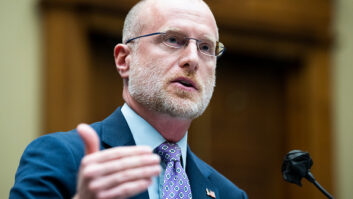Last week, the FCC announced it is moving forward on a plan that would require broadcasters to identify political ads that include AI-generated content. Ahead of the upcoming November elections, this is a priority for the agency’s Democratic chairwoman, Jessica Rosenworcel, who says the requirement would help increase transparency.
In recent months, however, the proposal has come under sharp scrutiny, specifically from Rosenworcel’s Republican counterparts.
Now the chairwoman has released a “fact sheet” expanding on the reasons for the proposal and what it would mean for TV and radio broadcasters.
The text is shared in its entirety below.
Overview
- In May 2024, FCC Chairwoman Jessica Rosenworcel proposed new transparency standards that would require disclosure when AI technology is used in political ads on radio and television. The FCC has now launched a proceeding during which it will take public comment on these simple disclosure transparency requirements.
Why is the FCC considering this proposal?
- Facing a rising tide of disinformation, roughly three-quarters of Americans say they are concerned about misleading AI-generated content. That’s why the FCC is focused on delivering on a simple standard that is grounded in a key principle of democracy—transparency. The American people deserve to know if the voices and images in political commercials are authentic or if they have been manipulated.
How will this increase transparency?
- This proposal aims to increase transparency by having those who already have legal duties to file information about their TV and radio advertisements with the FCC to indicate if AI is being used and make on-air disclosure of AI use.
Does the FCC have the legal authority to do this?
- As part of the 1934 Communications Act and the Bipartisan Campaign Reform Act, Congress granted the FCC authority regarding the political messages people see on television, hear over the radio, or receive over the phone.
- Since the 1930s, the FCC has used this authority to require broadcasters to maintain a publicly available file for political ads. This file has information about who bought a campaign ad, how much they paid for it, and when it ran. Over time Congress expanded these requirements to include ads run on cable and satellite. These are also the policies that led to what are now familiar on-air disclosures so that every viewer and listener knows who is responsible for every ad.
Will the FCC’s new rules prohibit the use of AI in political ads or hinder political speech?
- No. This proposal does not propose the prohibition of such content, only disclosing the use of AI within political ads.
- The FCC would make no judgment on the content being shared or prevent it from airing. This is not about telling the public what is true and what is false. It is about empowering every voter, viewer, and listener to make their own choices.
Will the FCC’s new rules impede the FEC’s ability to issue its own AI rules?
- No. In fact, FCC Chairwoman Rosenworcel has said she welcomes the FEC’s ongoing consideration of a rulemaking on AI. The FEC announced this year that they expect to act in early summer. In a recent letter to the FCC, the FEC’s vice chair wrote, “No one agency currently has the jurisdiction or the capacity to address every aspect of this large and complicated issue.”
- While the FEC can regulate AI use in online advertisements for federal candidates, the FCC can focus on the areas where the FEC is not able to act. The FEC does not oversee television and radio stations. Under the law, FEC authority over campaigns is limited to federal political candidates and does not extend to independent issue campaigns or state and local elections.
Does the proposal affect political advertising online and/or on social media?
- This proposal is an important first step, but it does have its limitations. Notably, it does not apply to online ads because that is outside the FCC’s authority.
Would different standards for TV and radio versus online/social media create confusion with the public?
- As the FEC deliberates on whether to act to regulate online political ads, states across the country are not waiting. Nearly half of the states in this country have enacted laws to regulate the use of AI and deepfake technology in elections. Most of these laws are bipartisan.
- And while those actions may not cover all aspects of how this technology may be used in our elections, these states understand the urgency of the moment we are in and the need to start somewhere. The FCC can help bring uniformity and stability to this patchwork of state laws, bringing greater transparency in our elections.
Would this proposal cause any disruption to upcoming elections this year?
- Campaigns are already familiar with these disclosure requirements. They have been using this system for years and the agency has updated it when needed. This change is timely and warranted because failure to require disclosure for AI only helps bad actors looking to use these new tools to deceive the public.
- The FCC has not provided a timeline of when it will issue final rules. At this point, this proposal only seeks feedback from the public about requiring disclosure of the use of AI technology in political advertisements on TV and radio, the first step before implementing new AI transparency requirements.
[Read More Radio World Stories About Artificial Intelligence]






